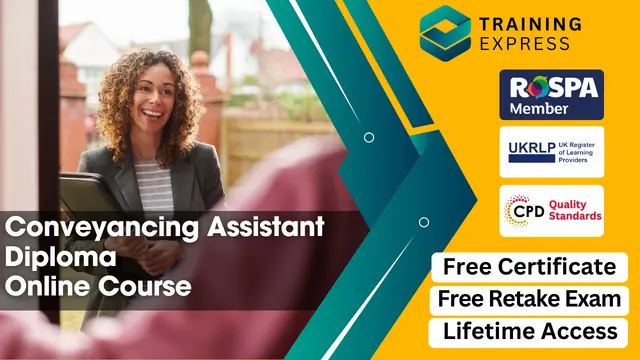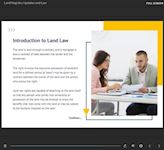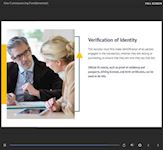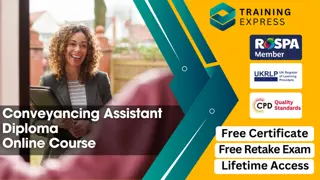
Conveyancing Assistant Diploma - CPD Certified
Free PDF & HARDCOPY Certificate included, Free Life Coaching Course I Free Retake Exam | Lifetime Access
Training Express Ltd
Summary
- Digital certificate - Free
- Hard copy certificate - Free
- Exam(s) / assessment(s) is included in price
- Tutor is available to students
Add to basket or enquire
Overview
This Conveyancing Assistant Diploma course is designed for Conveyancers, Lawyers, Property Lawyers, Real Estate Agents, and anyone interested to learn.
Conveyancing is the legal transfer of homeownership from one person to another. Through our Conveyancing course, you will learn more about conveyancing, types of conveyances, the difference between a conveyancer and a solicitor, what makes a good conveyance and the key fundamentals. You will furthermore find out what property law is, property law acts, commercial property law, personal property law, intellectual property law, land law, land registry law and land registry updates.
We will also take you through contracts, features of contracts, contract laws, acceptance and termination of laws, stages of residential conveyancing, process for buying and selling a property, accounting procedures for transactions, and preparing legal documents. To finish it off, we will ensure you know the registration laws, what makes tenants happy, fees and charges for both landlords and tenants, and taxation issues for conveyancers like capital gains tax, income tax relief, and stamp duty land tax.
Learning Outcomes
By the end of the Conveyancing course, learners will be able to:
- Get introduced to the key fundamentals
- Learn what conveyancing is and the different types
- Familiarise themselves with property law and land registry law
- Learn about conveyancing contracts and the features of contracts
- Know the standard transactions for buying and selling a property
- Display knowledge of preparing legal documents
- Get familiar with the accounting procedures for transactions
- Be aware of the taxation issues for conveyancers
Key Features
- CPD Certified Conveyancing Course
- Instant e-certificate
- Fully online, interactive Conveyancing course with audio voiceover
- Developed by qualified Conveyancing professionals in the field
- Self-paced learning and laptop, tablet, smartphone-friendly
- 24/7 Learning Assistance
- Discounts on bulk purchases
*** Additional Gifts ***
- Free Life Coaching Course
*** (Offer Ends Soon) ***
CPD
Course media
Description
Course Curriculum
The detailed curriculum outline of our course is as follows:
****Conveyancing Assistant Diploma***
- Module 01: Introduction to Conveyancing
- Module 02: Key Fundamentals of Conveyancing
- Module 03: Property Law & Practice
- Module 04: Land Registry Updates and Law
- Module 05: Law of Contract
- Module 06: Landlord and Tenant
- Module 07: Standard Transactions
- Module 08: Understanding Accounting Procedures for Transactions
- Module 09: Preparing Legal Documents
- Module 10: Taxation Issues for Conveyancers
Conveyancing Course Curriculum Breakdown
Module 01: Introduction to Conveyancing
- What is Conveyancing?
- Types of Conveyancing
- What Makes a Good Conveyancer?
- Difference Between a Solicitor and a Conveyancer
- Downsides of Using a Solicitor
- Steps of Conveyancing
Module 02: Key Fundamentals
- Verification of Identity
- Offer
- Searches and Surveys
- Property Searches
- Activities of the Surveyor
- Stamp Duty
- Cost of Conveyancing Services
Module 03: Landlord and Tenant
- General Information for Landlords and Tenants
- Why Landlords Contact Management Companies?
- The Landlord and Property Manager Relationship
- Registering Landlord and Property Details
- What Makes Tenants Happy?
- Talent Application Forms
- Vetting Prospective Tenants
- Guarantors
- Serving Notice and Notice Periods
- Fees and Charges for Tenants & Landlords
- Dealing with Problem Tenants and Other Issues
Module 04: Land Registry Updates and Law
- Introduction to Land Law
- Registered Land
- Unregistered Land
- Co-ownership
- Lease
- The Law of Mortgages
- Licences
Module 05: Law of Contract
- What is a Contract?
- Basis of Contract Laws
- Communication of Offers
- Termination of Offers
- Acceptance of an Offer
Module 06: Property Law & Practice
- What is Property Law?
- Property Law Acts
- Commercial Property Law
- Personal Property Law
- Intellectual Property Law
Module 07: Standard Conveyancing Transactions
- Stages of Residential Conveyancing
- Process of Selling a Property
- Process of Buying a Property
- Sales and Other Transactions
- Completion of Contract after Death
Module 08: Understanding Accounting Procedures for Conveyancing Transactions
- The Account Code
- Three-Digit Account Code Structure
- Accounts and Bookkeeping
- Recording Basic Transactions
- Mortgages
- The Conveyancing Transaction
- Value Added Tax
- Completion Statement
Module 09: Preparing Legal Documents
- Drafting an Agreement to Sell a Registered Title
- The Implied Promise as to Tile
- When Do We Need to Alter the Implied Promise as to Title?
- Barring Requisitions
- Drafting a Contract for the Sale of an Unregistered Title
- Other Necessary Conditions
- Drafting a Transfer of Registered Title
- Drafting a Conveyance of Unregistered Title
Module 10: Taxation Issues for Conveyancers
- Capital Gains Tax
- Income Tax Relief
- When to Not Pay Capital Gains Tax
- Stamp Duty Land Tax
- What is Stamp Duty (SDLT)?
- How Much is Stamp Duty in England & N.Ireland?
- Do I Have to Pay Stamp Duty as a First Time Buyer?
- How is Stamp Duty Paid?
- Stamp Duty Land Tax Form (SDLT1)
- Who submits the SDLT1 Form?
- How to Check Your Conveyancer Has Filed & Paid Your Stamp Duty
- Doing it Yourself
- Additional Forms
- Pro-Tip
- Stamp Duty Land Tax Reliefs and Exemptions
Accreditation
All of our courses, including this Conveyancing course, are fully CPD QS accredited, providing you with up-to-date skills and knowledge and helping you to become more competent and effective in your chosen field.
Certification
Once you’ve successfully completed your Conveyancing course, you will immediately be sent a digital certificate. Also, you can have your printed certificate delivered by post (shipping cost £3.99).
Assessment
At the end of the Conveyancing course, there will be an online assessment, which you will need to pass to complete the course.
Who is this course for?
Anyone with a knack for learning new skills can take this Conveyancing course. While this comprehensive training is popular for preparing people for job opportunities in the relevant fields, it also helps to advance your career for promotions.
Requirements
Learners do not require any prior knowledge or qualifications to enrol in this Conveyancing course.
Our flexible learning platform allows you to access the course from:
- any device
- any time
- anywhere
- any type of internet connection
Career path
- Junior Conveyancer
- Senior Conveyancer
- Supervisor
- Judicial Assistant
Questions and answers
Currently there are no Q&As for this course. Be the first to ask a question.
Certificates
Digital certificate
Digital certificate - Included
Hard copy certificate
Hard copy certificate - Included
You will get the hard copy certificates for Free! The delivery charge of the hard copy certificate inside the UK is £3.99 each.
Reviews
Currently there are no reviews for this course. Be the first to leave a review.
Legal information
This course is advertised on reed.co.uk by the Course Provider, whose terms and conditions apply. Purchases are made directly from the Course Provider, and as such, content and materials are supplied by the Course Provider directly. Reed is acting as agent and not reseller in relation to this course. Reed's only responsibility is to facilitate your payment for the course. It is your responsibility to review and agree to the Course Provider's terms and conditions and satisfy yourself as to the suitability of the course you intend to purchase. Reed will not have any responsibility for the content of the course and/or associated materials.





